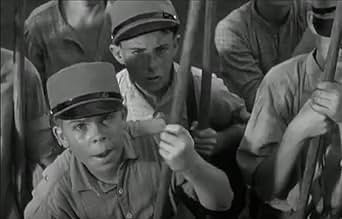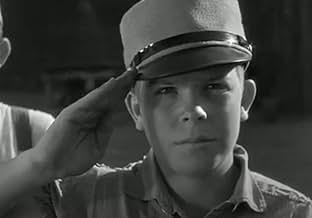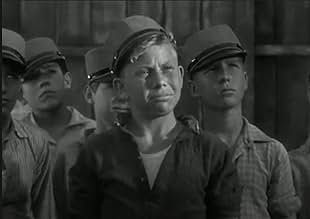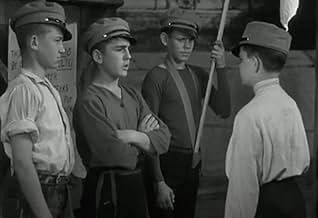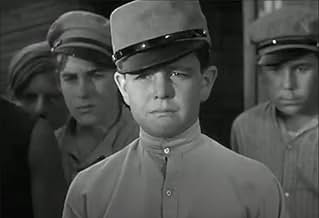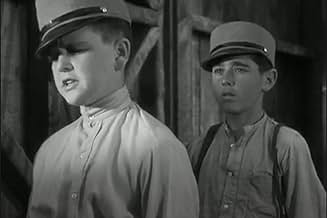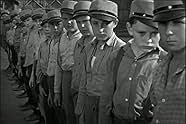VALUTAZIONE IMDb
6,9/10
578
LA TUA VALUTAZIONE
Aggiungi una trama nella tua linguaFrail Nemecsek, a lonely boy craving belonging, idolizes charismatic Boka, leader of a gang, in an evocative depiction of youth's pain and war's senselessness.Frail Nemecsek, a lonely boy craving belonging, idolizes charismatic Boka, leader of a gang, in an evocative depiction of youth's pain and war's senselessness.Frail Nemecsek, a lonely boy craving belonging, idolizes charismatic Boka, leader of a gang, in an evocative depiction of youth's pain and war's senselessness.
- Regia
- Sceneggiatura
- Star
- Premi
- 3 vittorie e 1 candidatura in totale
George P. Breakston
- Nemecsek
- (as George Breakston)
Jimmy Butler
- Boka
- (as Jimmie Butler)
Samuel S. Hinds
- Father
- (as Samuel Hinds)
Recensioni in evidenza
No Greater Glory is Frank Borzage's adaption of a biographical novel by Ferenc Molnar. It's set in the postwar depression that Germany had after World War I. As it opens we first see a veteran talking about the futility of war and then it cuts to a German school where the boys, there are no women in this film other than the lead character's mother, are being spoonfed the same militaristic propaganda that sent Lew Ayres and his friends off to the trenches.
These kids learn well and Lord of the Flies like they split into communities, rival communities that we call gangs. The gang we first meet is the Paul Street Boys and their leader Jimmy Butler. Another group of slightly older kids are trying to push these kids out of the vacant lot that the Paul Street kids play in. This means war and these kids have developed their own rules about it.
One kid, small and scrawny George Breakston wants so much to belong to the gang, but the others tease him and tell him he's too little. He spends the rest of the film trying to prove himself worthy.
No Greater Glory is a really heartbreaking film about kids with misplaced values, the kind who would later become good recruiting fodder for the Nazis. Breakston's performance will elicit tears from the stone lions at the New York Public Library. Frankie Darro and Butler as the rival gang leaders do well by their roles.
I'd love to know how Frank Borzage got Harry Cohn at Columbia Pictures to OK this project. It's a B film, no big stars involved at all, still it's not the most commercial of projects. Yet if you do see it, you will discover a classic.
These kids learn well and Lord of the Flies like they split into communities, rival communities that we call gangs. The gang we first meet is the Paul Street Boys and their leader Jimmy Butler. Another group of slightly older kids are trying to push these kids out of the vacant lot that the Paul Street kids play in. This means war and these kids have developed their own rules about it.
One kid, small and scrawny George Breakston wants so much to belong to the gang, but the others tease him and tell him he's too little. He spends the rest of the film trying to prove himself worthy.
No Greater Glory is a really heartbreaking film about kids with misplaced values, the kind who would later become good recruiting fodder for the Nazis. Breakston's performance will elicit tears from the stone lions at the New York Public Library. Frankie Darro and Butler as the rival gang leaders do well by their roles.
I'd love to know how Frank Borzage got Harry Cohn at Columbia Pictures to OK this project. It's a B film, no big stars involved at all, still it's not the most commercial of projects. Yet if you do see it, you will discover a classic.
Frank Borzage's films puzzle me in many respects. I can't figure out how he manages to move us but he does. I've seen all the often-quoted films - "Three Comrades", "Mortal Storm", "Man's Castle", "Seventh Heaven" - on more than one occasion and yet each time I am truly moved.
I first caught "No Greater Glory" at the Cinematheque in Paris with a friend when we were studying film. The audience was actually moved to tears! We're talking here about a French audience, a foreign language film not particularly well dubbed on film, an era never experienced by the young audience present at the time and performances by child actors unknown for the most part. Yes, the context in the film was European as were the names and places but the situation was Depression-era America, let there be no doubt about that, as were the actors and production staff. I'm still amazed why and how it worked its magic.
The young actors are never "cute", the lines in the film are more adult than child-like, the performances quite adequate but with no pulling-out-all-the-stops Academy Award-winning emoting. In short, it doesn't "feel" like a manipulative movie in any traditional sense of the word, yet we are manipulated by Borzage's hatred of war in general and his remarkable compassion and sincerity in translating his feelings onto the screen. This film is an absolute must!
Curtis Stotlar
I first caught "No Greater Glory" at the Cinematheque in Paris with a friend when we were studying film. The audience was actually moved to tears! We're talking here about a French audience, a foreign language film not particularly well dubbed on film, an era never experienced by the young audience present at the time and performances by child actors unknown for the most part. Yes, the context in the film was European as were the names and places but the situation was Depression-era America, let there be no doubt about that, as were the actors and production staff. I'm still amazed why and how it worked its magic.
The young actors are never "cute", the lines in the film are more adult than child-like, the performances quite adequate but with no pulling-out-all-the-stops Academy Award-winning emoting. In short, it doesn't "feel" like a manipulative movie in any traditional sense of the word, yet we are manipulated by Borzage's hatred of war in general and his remarkable compassion and sincerity in translating his feelings onto the screen. This film is an absolute must!
Curtis Stotlar
No musical spots, no romantic sub-plots, not even a girl around! Well, there's the great Lois Wilson as the leading kid's mother, and she's always worth watching, but make no mistake - this is about how boys develop their thinking process, their pecking order, and their views of the world. Not a hint of "boys will be boys," but boy, is it ever obvious in this unusually fearless, serious piece of anti-war propaganda. I would love to see this film restored, revived, and road-show-presented to every school in the country. It doesn't matter a dot that there are no girls in the story, either, as the subject is more valid today, perhaps, in light of world terrorism and how boys are being raised in other lands, than it might have been considered in 1934. We've enjoyed Molnar plays and tales - Liliom, The Good Fairy, The Guardsman, et al, but nothing prepared me for this hard-hitting, no holds barred filming of his book, the Paul Street Boys. There are plenty of marvelous character players, including Christian Rub, Samuel S. Hinds, Ralph Morgan, and of course, Miss Wilson, but it is the younger actors who race away with this picture, particularly everyone's favorite brat, Jackie Searle (who will not disappoint you!), and everyone's favorite tough guy, Frankie Darro, here offering a more layered, thoughtful performance than he is usually allowed to give. Though all the boys are terrific, one stands out, young Georgie Breakston (remember that wonderful moment in IT HAPPENED ONE NIGHT just after everyone sings "The Man on the Flying Trapeze" - the bus hits the mud and everyone goes flying - it was Georgie Breakston who broke the mood with his plaintive "Ma! Ma!" and gets the money from Colbert and Gable!!) effectively carrying the picture on his tiny shoulders. His performance in NO GREATER GLORY makes a lot of more famous child players seem like cardboard cut-outs. Write to your Congressman about this one, but try and find a copy and show it to your children!
No Greater Glory (1934)
*** (out of 4)
A rather strange anti-war film that tells the story of two rival kid gangs who are planning to go to war in order to fight over a vacant playground that both sides want. Jimmy Butler plays Boka, a small child who is the only Private in his gang, because he's so small, yet he's the only one will to risk his neck for the greater good of the gang. I've heard people call this a Our Gang Goes to War film and perhaps that isn't too far off base but in the end this is a film I respected a lot more than enjoyed. I'm sure many, many people are going to watch this film and love it but I wouldn't go that far. I think the message is loud and clear but to me it's way too loud and clear. This is the second film I've seen from Borzage's career during this period, the other being Young America, and there's no doubt he wants to get his views across but I think in both films he goes a little overboard. The most impressive thing about this film are the child performances, which range from very good to downright excellent. I was very impressed with the young Butler not only because of his acting but because of his small structure and his ability to rise up and battle. It was a little sad and ironic when I read that he would die in WW2 fighting for his country. George P. Breakston, Jackie Searl and Frankie Darro also add nice work with future Dick Tracy Ralph Morgan having a small role. Another major plus was the cinematography, which looked extremely well and so focused that you couldn't help but feel as if you were there during all the action. The ending, which goes for emotions, certainly gets them and remains one of the most powerful scenes from this era.
*** (out of 4)
A rather strange anti-war film that tells the story of two rival kid gangs who are planning to go to war in order to fight over a vacant playground that both sides want. Jimmy Butler plays Boka, a small child who is the only Private in his gang, because he's so small, yet he's the only one will to risk his neck for the greater good of the gang. I've heard people call this a Our Gang Goes to War film and perhaps that isn't too far off base but in the end this is a film I respected a lot more than enjoyed. I'm sure many, many people are going to watch this film and love it but I wouldn't go that far. I think the message is loud and clear but to me it's way too loud and clear. This is the second film I've seen from Borzage's career during this period, the other being Young America, and there's no doubt he wants to get his views across but I think in both films he goes a little overboard. The most impressive thing about this film are the child performances, which range from very good to downright excellent. I was very impressed with the young Butler not only because of his acting but because of his small structure and his ability to rise up and battle. It was a little sad and ironic when I read that he would die in WW2 fighting for his country. George P. Breakston, Jackie Searl and Frankie Darro also add nice work with future Dick Tracy Ralph Morgan having a small role. Another major plus was the cinematography, which looked extremely well and so focused that you couldn't help but feel as if you were there during all the action. The ending, which goes for emotions, certainly gets them and remains one of the most powerful scenes from this era.
This is a bizarre and very heavy-handed film. Instead of showing adults at war, this film does war on a small scale--with children playing war. This isn't just kids playing war, but they have ranks, follow orders and act much like adults would in war. And, almost the entire film consists of kids acting--with only a few adults here and there. This strange idea seemed to impress most of the reviewers but I couldn't get into it--mostly because it all seemed rather fake and I also thought that children playing war and acting as if it's all lots of fun just seemed a bit grotesque. Although I know it was meant as an allegory about war and heroism and the futility of war--it seemed like it could also be taken as a pro-war film as well! As for the kids, all but Frankie Darro were unknowns and the acting, for kids, was pretty good. But it was also sappy from start to finish--and also made war seem pretty cool--like a recruitment film for the next war.
I guess I am a voice of dissent, but I didn't like the film--though I did at least respect the acting (for the most part) and give it a 4 simply for technical merit. Also, I nominate George P. Breakston for a special award for Best Performance By a Crazy Kid for his acting at the 61 minute mark. It has to be seen to be believed. Further, I nominate all the parents for the Most Irresponsible Parenting award for encouraging their little ragamuffins to become little warmongers.
I guess I am a voice of dissent, but I didn't like the film--though I did at least respect the acting (for the most part) and give it a 4 simply for technical merit. Also, I nominate George P. Breakston for a special award for Best Performance By a Crazy Kid for his acting at the 61 minute mark. It has to be seen to be believed. Further, I nominate all the parents for the Most Irresponsible Parenting award for encouraging their little ragamuffins to become little warmongers.
Lo sapevi?
- QuizJimmy Butler was killed during World War II on February 18, 1945 in France.
- ConnessioniEdited from All'ovest niente di nuovo (1930)
I più visti
Accedi per valutare e creare un elenco di titoli salvati per ottenere consigli personalizzati
- How long is No Greater Glory?Powered by Alexa
Dettagli
- Tempo di esecuzione
- 1h 14min(74 min)
- Colore
- Proporzioni
- 1.37 : 1
Contribuisci a questa pagina
Suggerisci una modifica o aggiungi i contenuti mancanti

